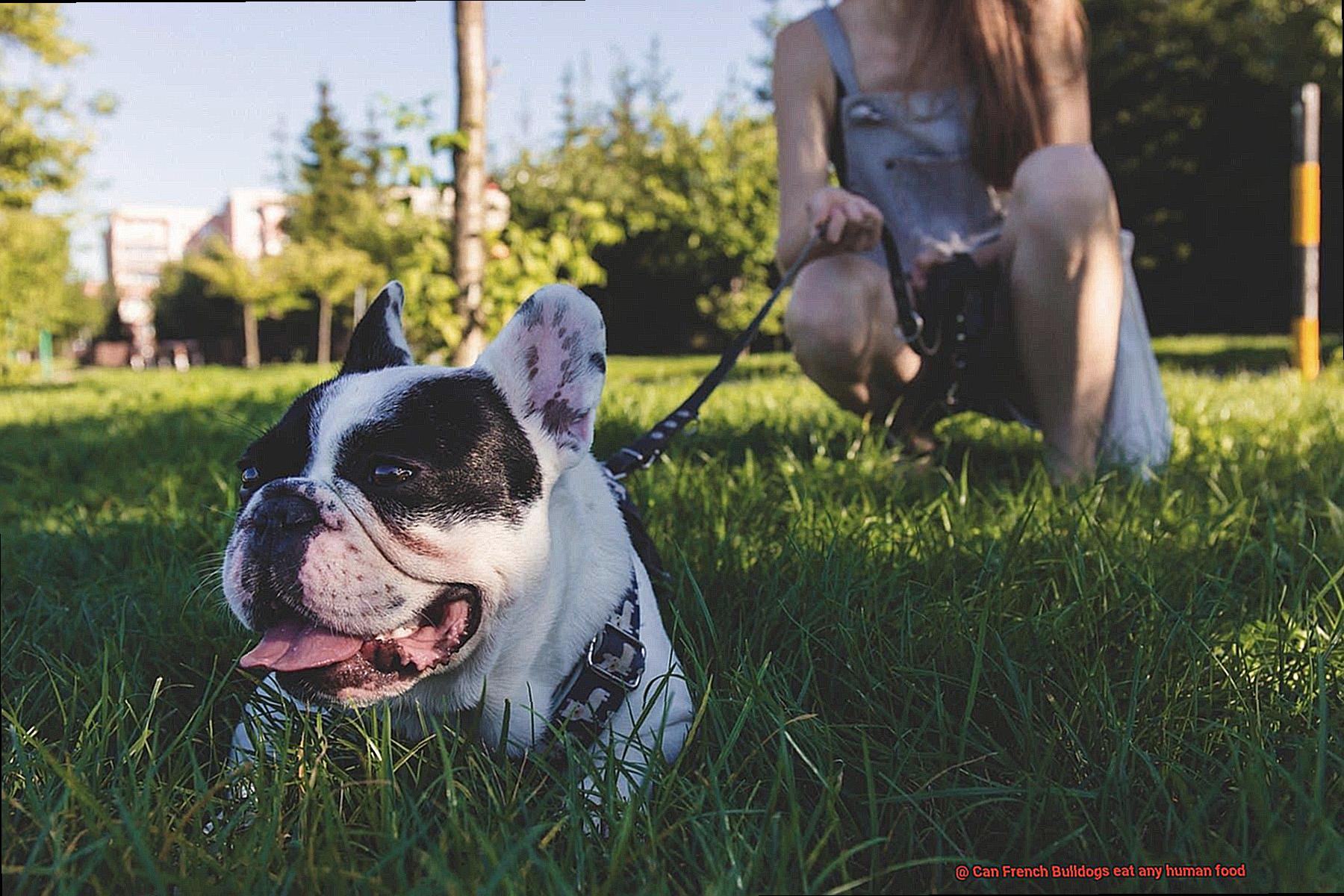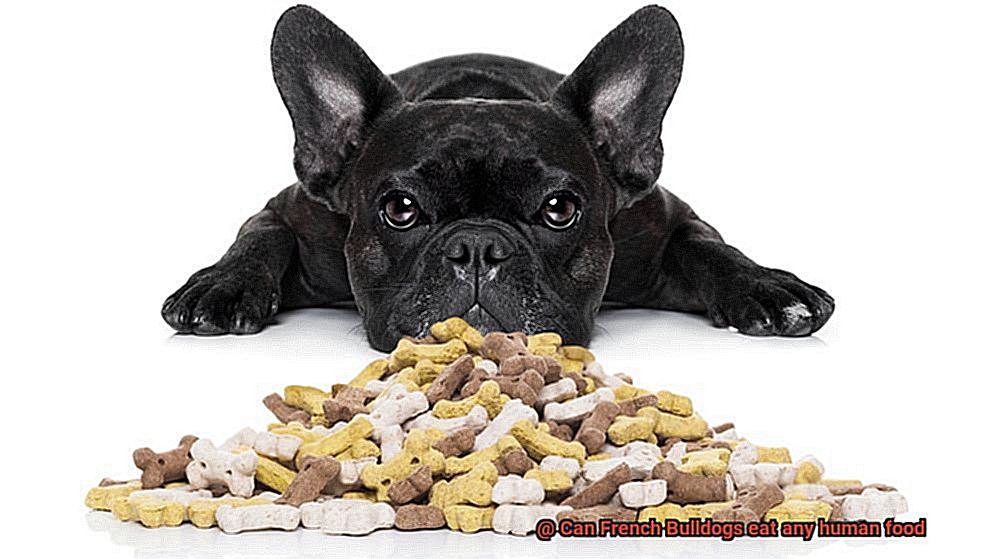Can French Bulldogs eat any human food?
French Bulldogs, with their irresistible jowls and undeniable charm, have a way of melting our hearts. As devoted owners, we’re constantly on the lookout for ways to keep our furry companions happy and healthy. But amidst the search for culinary variety, have you ever wondered if French Bulldogs can partake in our own gastronomic delights? Are they limited to kibble and treats, or can they venture into the realm of human food?
In this blog post, we embark on a quest to uncover the truth about French Bulldogs’ dietary needs and whether they can savor human food. While it’s crucial to provide them with a well-balanced diet brimming with essential nutrients, there are indeed some human foods that can be safely enjoyed by these four-legged connoisseurs.
First things first: moderation is key. While some human foods are safe and offer additional nutritional benefits, it’s important to avoid overindulgence as it could lead to weight gain, tummy troubles, or even toxic reactions.
So what delectable delights can French Bulldogs relish? Cooked lean meats like chicken, turkey, or beef (sans seasoning) can serve as a mouthwatering addition to their meals. These protein sources promote muscle growth and provide the energy needed for a healthy lifestyle. And let’s not forget about veggies. Carrots, green beans, and sweet potatoes pack a nutritious punch with their abundance of vitamins and minerals.
But wait – there’s more. Certain fruits like bananas, apples, and blueberries make for tantalizingly tasty treats packed with essential vitamins. However, it’s crucial to remember that some fruits – like grapes or raisins – are off-limits as they’re toxic to dogs.
In conclusion, while French Bulldogs do have specific dietary needs, they can enjoy select human foods in moderation. As responsible pet owners, it’s our duty to ensure that these “Frenchie” delicacies complement a balanced and veterinarian-approved diet. Stay tuned for our upcoming blog posts where we’ll dive into other intriguing aspects of French Bulldogs’ care and well-being.
So the next time you’re sharing a meal with your beloved French Bulldog, don’t forget to include their own bowl of nutritionally-appropriate delights alongside your feast.
Understanding French Bulldog Dietary Needs
Contents
- 1 Understanding French Bulldog Dietary Needs
- 2 Fruits That Are Safe for French Bulldogs to Eat
- 3 Vegetables That Should Be Avoided by French Bulldogs
- 4 The Benefits of Feeding Lean Meats to French Bulldogs
- 5 Dairy Products and Their Potential Risks for French Bulldogs
- 6 Avoiding Processed Human Foods for French Bulldogs
- 7 Artificial Sweeteners and Their Toxicity to Dogs
- 8 Consulting With a Veterinarian About Your French Bulldog’s Diet
- 9 Conclusion
French Bulldogs are notorious for their adorable looks and lovable personalities. As a proud owner of one of these delightful dogs, it’s important to understand their unique dietary needs to ensure their health and happiness. In this guide, we will dive into the world of French Bulldog dietary needs, with a particular focus on sensitivities and allergies. So grab a cup of coffee (or a bowl of kibble) and let’s get started.
Sensitive Stomachs: A Delicate Digestive System
One key aspect of understanding French Bulldog dietary needs is recognizing their sensitivity to certain ingredients. These cute little pups often have sensitive stomachs, which means they may not be able to tolerate certain types of food that humans commonly consume. Foods high in fat or spices can lead to digestive issues such as flatulence and diarrhea. So, it’s best to avoid feeding them greasy or heavily seasoned human foods.
Allergies: Keep an Eye on Ingredients
French Bulldogs have a higher risk of developing allergies compared to other breeds. This means that certain human foods, including dairy products or grains, may trigger allergic reactions in these dogs. It’s crucial to be aware of any potential allergies your French Bulldog may have and avoid feeding them foods that could cause a negative reaction.
Balanced and Nutritious: Fueling Your Frenchie
In addition to being mindful of their sensitivities and allergies, it’s essential to provide French Bulldogs with a balanced and nutritious diet. While some human foods can be safely incorporated into their meals, it’s important to ensure they’re getting all the necessary nutrients from their regular dog food. French Bulldogs require a diet rich in protein to support their muscle development and overall health. Lean meats like chicken or turkey can be a safe and healthy option.
Toxic Foods: Keep Them Out of Reach
Furthermore, it’s crucial to avoid feeding French Bulldogs certain types of human food that are known to be toxic for dogs. Chocolate, grapes, onions, garlic, and avocado are just a few examples of foods that can be harmful and even fatal if ingested by dogs. It’s important to educate yourself about these toxic foods and make sure to keep them out of your French Bulldog’s reach.
Consult the Experts: Veterinarians and Canine Nutritionists
While French Bulldogs can enjoy some human food in moderation, it’s vital to understand their specific dietary needs and limitations. Consulting with a veterinarian or a canine nutritionist can provide valuable guidance in determining what types of human food are safe for your French Bulldog to consume. By being aware of their sensitivities, allergies, and nutritional requirements, you can ensure that your furry friend remains healthy and happy.
Fruits That Are Safe for French Bulldogs to Eat
French Bulldogs are adorable little pups with big personalities, and they deserve the best when it comes to their nutrition. While a balanced diet of high-quality dog food is essential, adding some fruit to their meals can be a tasty and healthy treat. But not all fruits are safe for our four-legged friends, so let’s dive into the fruity realm and find out which ones are pup-approved.
- Bananas: These yellow delights are not only a favorite of monkeys but also French Bulldogs. Bananas are packed with potassium, vitamin C, and vitamin B6, which can help regulate your pup’s digestion. Plus, they’re super easy to digest, making them a perfect snack for your Frenchie.
- Apples: An apple a day keeps the vet away. Apples are rich in fiber, vitamins A and C, and antioxidants. However, make sure to remove the seeds and core before giving them to your furry friend as they can be a choking hazard. Slice them up into bite-sized pieces and watch your Frenchie enjoy.
- Blueberries: These tiny blue powerhouses are packed with antioxidants that can give your Frenchie’s immune system a boost. They also contain fiber and vitamins C and K. Pop a few of these juicy treats into their bowl, and watch those tails wag with joy.
- Watermelon: When the weather gets hot, give your Frenchie a slice of watermelon to cool down. Not only is it hydrating due to its high water content, but it’s also a great source of vitamins A and C. Remember to remove the seeds and rind before serving.
- Strawberries: Who doesn’t love these sweet red berries? Strawberries are safe for Frenchies and contain fiber, antioxidants, and vitamin C. Just make sure to cut them into small pieces to prevent any choking hazards.
- Pineapple: If your Frenchie needs a little digestive aid, pineapple is the fruit for them. Pineapple contains bromelain, an enzyme that can help with digestion. Remove the skin and core before serving, and your pup will be in tropical heaven.
- Raspberries, Blackberries, and Pears: These fruits are also safe for French Bulldogs and provide various vitamins, fiber, and antioxidants. Mix them up for a fruity medley that will have your Frenchie begging for more.
Remember, moderation is key when it comes to feeding fruits to your furry friend. Introduce new fruits gradually to monitor for any potential allergic reactions or digestive issues. Always wash fruits thoroughly and remove any seeds or pits before serving them. And as with any dietary changes, it’s best to consult with your veterinarian to ensure that you’re meeting your Frenchie’s specific needs.
Vegetables That Should Be Avoided by French Bulldogs
While French Bulldogs can enjoy some human food in moderation, there are certain vegetables that should be avoided due to their potential harmful effects on these furry friends.
Onions:
Onions contain a substance called thiosulphate, which can damage a dog’s red blood cells and lead to a condition called hemolytic anemia. Even small amounts of onions, whether raw, cooked, or in powdered form, can be toxic to French Bulldogs and should be avoided at all costs.
Garlic:
Like onions, garlic contains thiosulphate, which can cause the same harmful effects on a dog’s red blood cells. Additionally, garlic can also cause an upset stomach, vomiting, and diarrhea in French Bulldogs.
Avocado:
While it may be a healthy choice for humans, avocados contain a substance called persin, which is toxic to dogs. Persin can cause vomiting, diarrhea, and even pancreatitis in French Bulldogs. The pit of the avocado should also be avoided as it poses a choking hazard to these small dogs.
Tomatoes:
Although tomatoes are commonly used in various dishes, they should not be fed to French Bulldogs. Tomatoes contain a compound called solanine, which is toxic to dogs when consumed in large quantities. While ripe tomatoes are generally safe, the green parts of the plant, including the stems and leaves, contain higher levels of solanine and can cause gastrointestinal upset in French Bulldogs.
Mushrooms:
Some species of mushrooms can be highly toxic to dogs and may cause severe reactions such as vomiting, diarrhea, abdominal pain, drooling, seizures, and even death. It is essential to keep mushrooms away from your French Bulldog’s reach and ensure they are not accidentally ingested.
Rhubarb:
Rhubarb contains high levels of oxalic acid, which can cause kidney damage and other serious health issues if ingested by these small dogs. It’s best to keep rhubarb out of your French Bulldog’s diet to prevent any potential complications.
The Benefits of Feeding Lean Meats to French Bulldogs
If you’re wondering how to keep your furry friend healthy and happy, then lean meats might just be the answer. In this pawsome blog post, we’ll dive into the benefits of feeding lean meats to French Bulldogs. So let’s dig in.
Protein Powerhouses:
Lean meats like chicken, turkey, and lean cuts of beef are packed with protein, a vital nutrient for our four-legged pals. Protein helps with tissue repair, muscle growth, and boosts their immune system. It’s like a little superhero for their overall health.
Weight Management:
French Bulldogs have a tendency to pack on the pounds, so it’s important to watch their waistline. Lean meats are low in fat and calories, making them the pawfect choice for Frenchie weight management. Help your pup shed those extra pounds or maintain a healthy weight with these lean treats.
Nutrient-Rich Delights:
Not only are lean meats high in protein, but they also contain essential vitamins and minerals that keep your Frenchie feeling fabulous. B-vitamins, iron, zinc, and selenium are just a few of the nutrients found in these meats that contribute to energy production, promote healthy skin and coat, and boost their immune system.
Happy Tummies:
Frenchies can sometimes have sensitive tummies, but lean meats are easily digestible and can help prevent tummy troubles like diarrhea or constipation. The dietary fiber found in lean meats aids in proper digestion and keeps their digestive system happy and healthy.
Allergy-Friendly Options:

If your Frenchie has food allergies or sensitivities, lean meats can be a great alternative to commercial dog foods that may contain potential allergens. By providing lean meats as part of a balanced diet, you can avoid those pesky triggers and give your pup a more natural and nutritious food option.
Dairy Products and Their Potential Risks for French Bulldogs
French Bulldogs are absolutely adorable. With their squishy faces and playful personalities, it’s hard to resist spoiling them with treats. But when it comes to dairy products, you might want to think twice before sharing that ice cream cone with your furry friend. Let’s dive into the potential risks of feeding dairy to French Bulldogs and explore alternative options that will keep them healthy and happy.
Lactose Intolerance: A Tummy Troublemaker
French Bulldogs, like many dogs, lack the necessary enzymes to properly digest lactose, the sugar found in milk and dairy products. This means that indulging in a cheesy snack can lead to digestive issues like gas, bloating, diarrhea, and even vomiting. Nobody wants their four-legged friend to suffer from an upset tummy.
Weight Worries: Say No to Puppy Pounds
Another risk of dairy products for French Bulldogs is their high fat content. Just like us humans, too much fat can pack on the pounds and contribute to obesity. And let’s be honest, extra weight is not a good look for our beloved Frenchies. Obesity can lead to a myriad of health problems, including joint issues, heart disease, and a shorter lifespan. So let’s keep those puppy pounds in check.
Allergies: Dairy Drama for Your Frenchie
Dairy is a common allergen for dogs, including French Bulldogs. If your Frenchie starts scratching like there’s no tomorrow or develops skin rashes after devouring a cheesy treat, it could be a sign of a dairy allergy or sensitivity. Ear infections and gastrointestinal issues can also be indicators of dairy-related woes. If you suspect your furry friend has an adverse reaction to dairy, consult your veterinarian for guidance.
Dog-Friendly Alternatives: Treats without the Tummy Troubles
Now that we know the potential risks, what can we feed our French Bulldogs instead? Fear not, there are plenty of dog-friendly alternatives that will satisfy their taste buds without upsetting their delicate tummies. Lactose-free milk or yogurt formulated specifically for dogs are great options. These treats are easier to digest and won’t cause any of the dairy-related issues we’ve discussed.
Avoiding Processed Human Foods for French Bulldogs
French Bulldogs are adorable, compact, and lovable companions. As a French Bulldog owner myself, I understand how tempting it can be to share our favorite foods with them. However, it is crucial to remember that French Bulldogs have specific dietary needs that differ from ours. Feeding them processed human foods can have detrimental effects on their health and well-being.
High Levels of Sodium, Sugar, Additives, and Preservatives
Processed human foods often contain high levels of sodium, sugar, additives, and preservatives. These ingredients can wreak havoc on a French Bulldog’s system. Excessive sodium intake can lead to dehydration and kidney problems. Too much sugar can contribute to weight gain and obesity in French Bulldogs, which can further exacerbate health issues such as joint problems and breathing difficulties.
Digestive Upset and Disruption of Gut Health
French Bulldogs have sensitive digestive systems. Feeding them processed human foods can cause digestive upset, including diarrhea and vomiting. These foods are often packed with artificial flavors, colors, and sweeteners that can disrupt their gut health. It’s important to keep an eye out for any adverse reactions your French Bulldog may have after consuming processed human foods.
Toxic Foods
Certain foods that are perfectly safe for humans can be toxic to dogs, including French Bulldogs. Chocolate, onions, garlic, grapes, raisins, avocados, and caffeine should never be given to them as they can be toxic and potentially fatal. It’s crucial to educate yourself on the list of toxic foods for dogs and ensure they are kept out of reach.
The Importance of a Balanced Diet
Instead of relying on processed human foods, it is essential to provide French Bulldogs with a balanced diet that meets their specific nutritional needs. High-quality dog food that is specifically formulated for French Bulldogs is the best option. These diets contain the right balance of proteins, fats, carbohydrates, vitamins, and minerals to support their overall health.

Safe Human Food Options
If you want to treat your French Bulldog with human food occasionally, there are safe options available. Plain cooked chicken or turkey (without seasoning or bones), plain cooked vegetables like carrots or green beans, plain yogurt (without added sugars), and small pieces of fresh fruits such as apples or blueberries are some examples. Always introduce new foods gradually and monitor their reaction.
Artificial Sweeteners and Their Toxicity to Dogs
As a French Bulldog owner, it is essential to understand the potential dangers that certain foods can pose to your furry friend. One particular ingredient that can be extremely toxic to dogs, including French Bulldogs, is xylitol, an artificial sweetener commonly used in many human foods as a sugar substitute.
Xylitol is highly toxic to dogs and can have devastating effects on their health. Even small amounts of xylitol can be dangerous, so it is crucial for French Bulldog owners to be vigilant about checking ingredient labels before giving any human food to their pets.
So why is xylitol so dangerous for French Bulldogs? Let’s take a closer look:
- The Dangers of Xylitol: Xylitol can cause a range of symptoms in dogs, from mild gastrointestinal upset to severe hypoglycemia (low blood sugar) and liver failure. French Bulldogs, like all dogs, are particularly susceptible to the toxic effects of xylitol.
- Common Sources of Xylitol: Xylitol is often found in products such as sugar-free gum, candy, baked goods, and even some peanut butter brands. It can be challenging to determine the amount of xylitol present in a particular product as manufacturers are not required to disclose the exact quantity on the label.
- Recognizing Xylitol Toxicity Symptoms: If a French Bulldog ingests xylitol, it is crucial to seek immediate veterinary care as the effects can be life-threatening. Symptoms of xylitol toxicity in dogs may include vomiting, diarrhea, weakness, tremors, seizures, collapse, and even death.
To keep your French Bulldog safe from xylitol toxicity:
- Always check ingredient labels before sharing any human food with your pet.
- Avoid giving your French Bulldog foods that contain artificial sweeteners or any products labeled as sugar-free.
- Stick to a balanced and nutritionally complete diet specifically formulated for dogs to ensure your French Bulldog receives all the necessary nutrients.
Consulting With a Veterinarian About Your French Bulldog’s Diet
When it comes to your French Bulldog’s diet, seeking professional advice from a veterinarian is essential. In this article, we will explore the importance of consulting with a veterinarian about your French Bulldog’s diet. From discussing breed-specific nutritional requirements to addressing portion sizes and feeding schedules, a veterinarian can guide you in providing the best nutrition for your furry friend.
Understanding Breed-Specific Nutritional Needs:
French Bulldogs have unique dietary needs due to their physiology and potential health concerns. Consulting with a veterinarian will help you understand these specific requirements better. For example, French Bulldogs are prone to weight gain, allergies, and sensitive stomachs. A veterinarian can provide guidance on choosing the right food options to address these issues and keep your dog healthy.
Portion Sizes and Feeding Schedules:
French Bulldogs have a tendency to overeat, which can lead to obesity and related health problems. Your veterinarian can help determine the appropriate portion sizes and feeding schedule based on your dog’s age, size, activity level, and overall health condition. By following their advice, you can prevent weight gain and ensure that your dog receives the right amount of nutrition.
Addressing Dietary Restrictions and Preferences:
Some French Bulldogs may have allergies or sensitivities to certain ingredients commonly found in human food. By discussing these concerns with a veterinarian, you can ensure that your dog’s diet is free from any potential allergens or irritants. Your veterinarian can recommend suitable alternatives or specialized diets to meet your dog’s specific dietary needs.
Ongoing Monitoring and Adjustments:
A veterinarian’s expertise is invaluable when it comes to monitoring your French Bulldog’s diet over time. Nutritional needs can change due to factors like age, activity level, or underlying health conditions. Regular check-ups with a veterinarian will ensure that your dog’s diet is always tailored to their specific needs, and any necessary adjustments can be made promptly.
QWjHgA7dYqw” >
Conclusion
In conclusion, while French Bulldogs can enjoy some human food in moderation, it is crucial to be mindful of their specific dietary needs.
Certain foods, such as chocolate, onions, and grapes, should always be avoided as they can be toxic to these adorable pooches. Instead, opt for healthier alternatives like lean meats, fruits, and vegetables that provide essential nutrients without compromising their well-being.
Remember, a balanced and tailored diet is key to keeping your French Bulldog happy and healthy for years to come.




